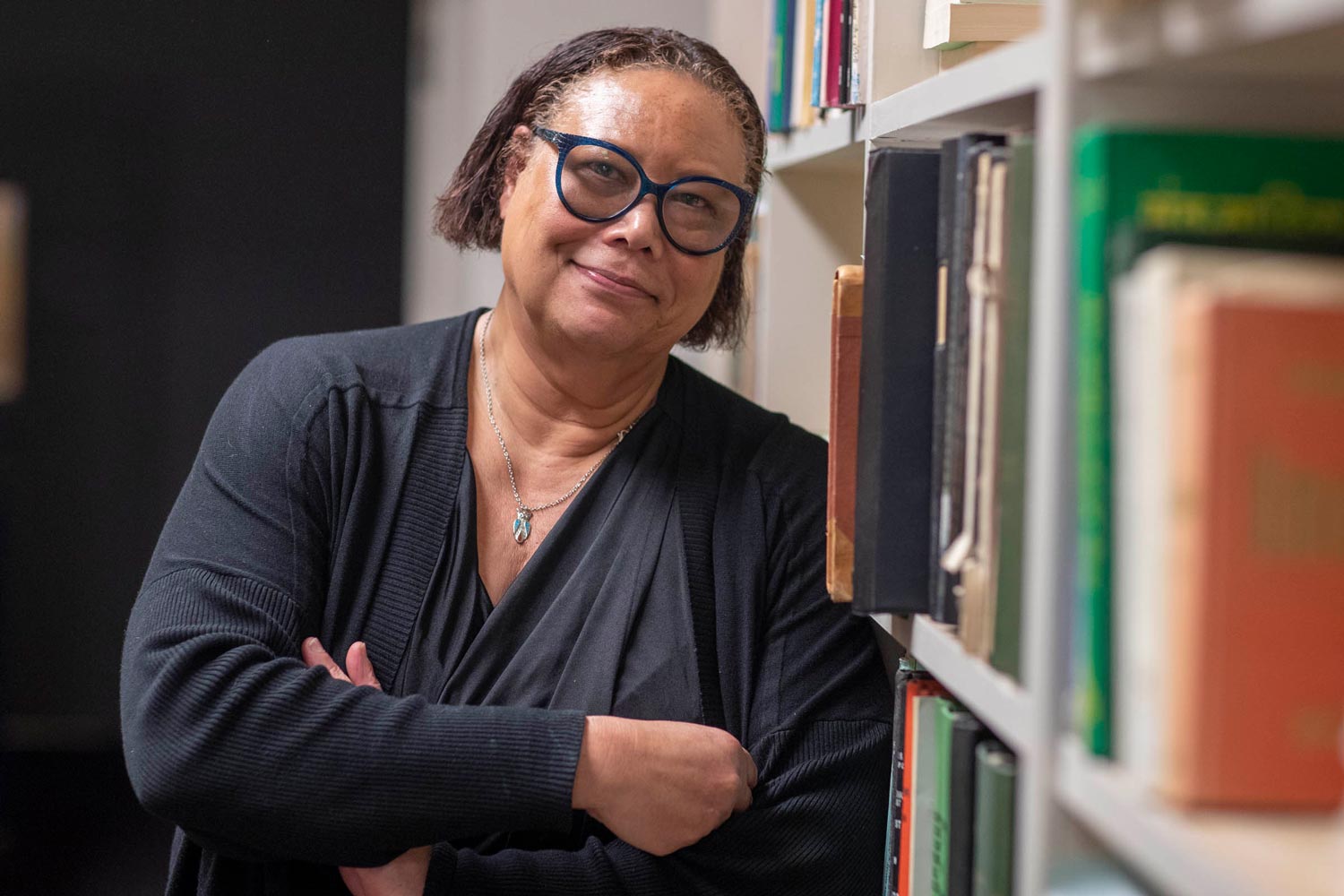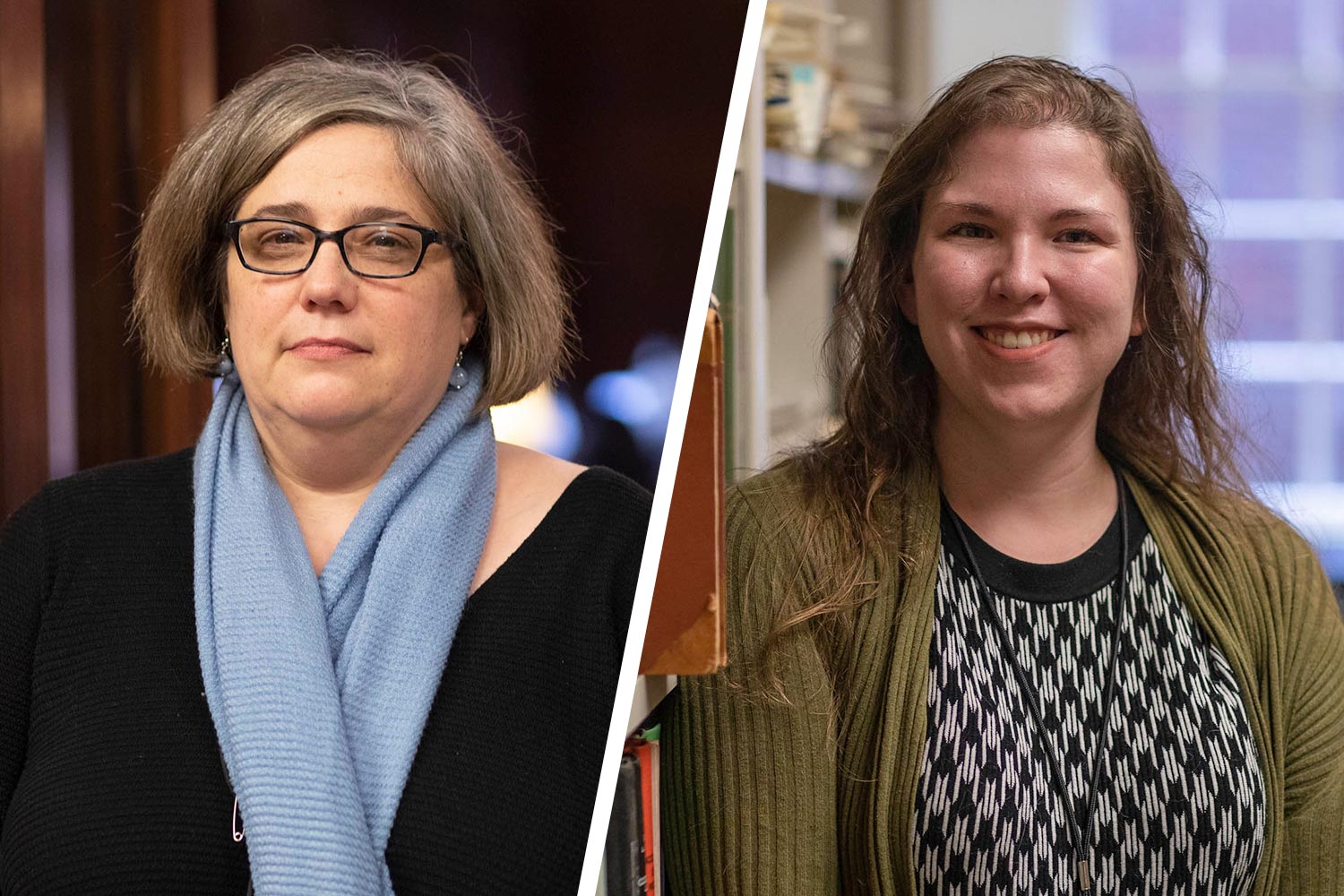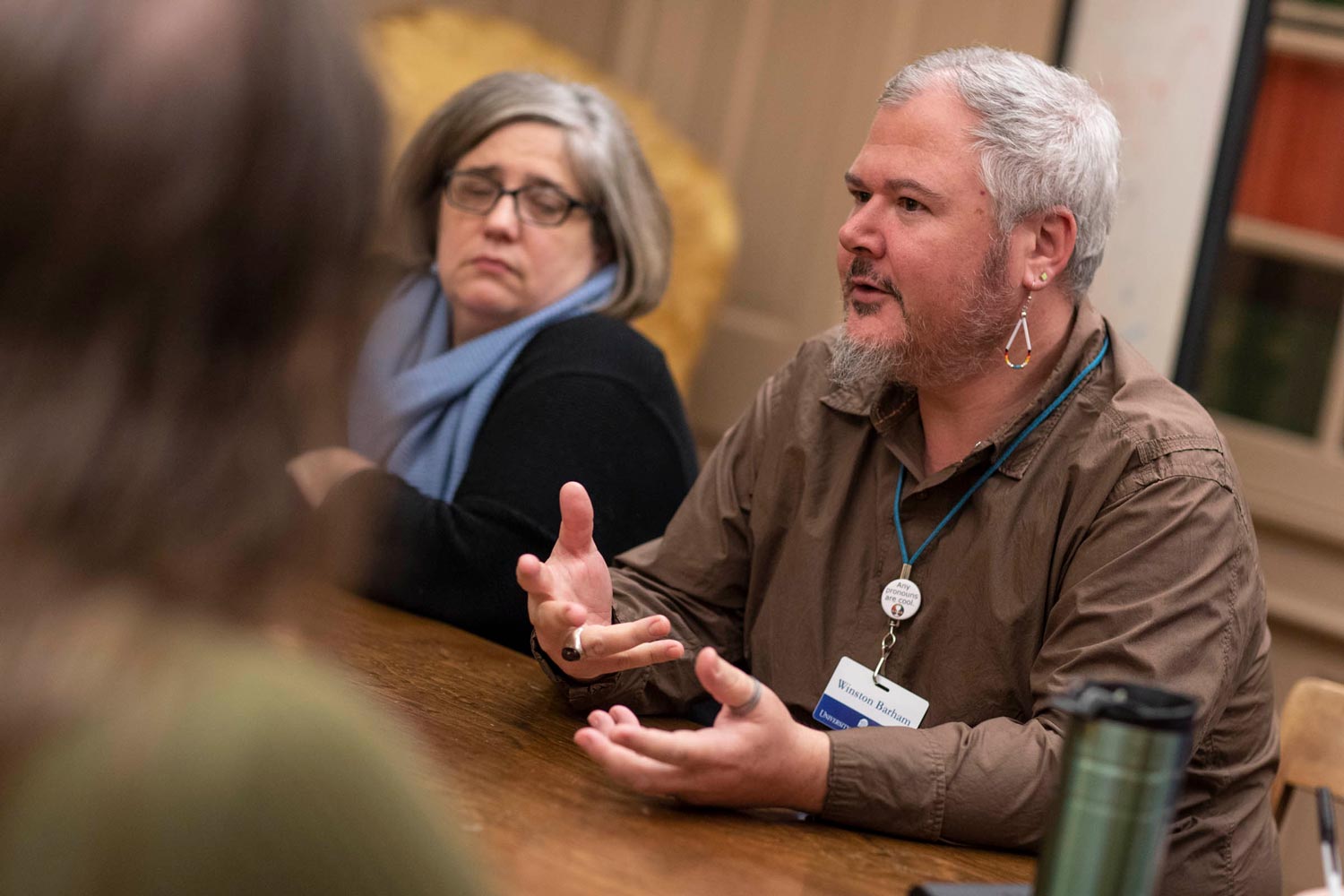One employee traveled to the U.S.-Mexico border. Another joined a social justice group in Charlottesville. Another started a book group to explore the effects of a dominant white culture.
These and other activities are helping employees of the University of Virginia Library to meet a new workplace goal called “understanding difference.”
The library’s organizational goal challenges employees to “at least once a year, do something that helps you understand life experiences that are significantly different from your own.”
“That may include classes or workshops, conferences, retreats, religious observances, volunteer activities, or other activities that bring you into conversation with people different from those with whom you normally associate, with the goal of increasing our cultural fluency and improving our information services,” University Librarian and Dean John M. Unsworth said.
Unsworth said the “understanding difference” goal was instituted early this year, so it will be included in the next round of employee annual reviews.
Since he took the helm of the library two years ago, Unsworth has promoted several diversity initiatives, including establishing the library’s Office of Inclusion, Diversity and Equity, and hiring Phylissa Mitchell as director last year.
 Phylissa Mitchell came to the Grounds last year to direct the library’s Office of Inclusion, Diversity and Equity.
Phylissa Mitchell came to the Grounds last year to direct the library’s Office of Inclusion, Diversity and Equity.
“It’s been my experience that if you want an organization to produce a result or accomplish a task, that work is most likely to happen if it is part of someone’s job,” Unsworth said. “Our diversity efforts were everyone’s responsibility and no one’s responsibility at the same time. So I created a senior position, reporting to me and tasked with moving the library forward toward greater diversity and inclusion.”
Employees have a wide range of options for meeting the “understanding differences” goal. Just reading one book or watching a film by yourself isn’t enough – but doing those things with others and talking about it could meet the goal. It should come as no surprise that librarians and other library employees have created reading groups to expand their perspectives and discuss what they’re learning.
Mitchell, charged with creating programs to attract underrepresented populations to library professions and to UVA, is also responsible for inclusion and equity outreach across libraries and the University. Previously, she taught journalism skills, critical race theory and First Amendment law at Washington & Lee University and its School of Law, and at West Virginia University, UVA and the University of Richmond. Mitchell was a Fulbright Scholar in Ukraine from 2008 to 2010, based at Taras Shevchenko National University of Kyiv, and taught throughout Ukraine and post-Soviet Eastern Europe.
One of her duties is providing programs – often working collaboratively with the library’s organizational development expert, Suzanne Bombard, plus other departments, units and community groups – that serve as a base for the “understanding difference” goal. She has organized events for the University’s Rev. Martin Luther King Jr. Community Celebration, Black History Month and other ethnic heritage months, plus “workshops, discussion groups, career fairs, you name it,” she said.
One recent guest speaker she brought here was Jacqueline Battalora, who became a Chicago police officer after earning a law degree and a Ph.D. Currently a sociology professor at Saint Xavier University in Chicago, Battalora gave a lecture and workshop about the legal creation of the class of “white people,” dating back to colonial times and Bacon’s Rebellion, based on her book, “Birth of a White Nation: The Invention of White People and Its Relevance Today.”
Unsworth said, “Battalora’s talk on the invention of white people was very instructive, and argued that whiteness didn’t always exist, but was invented – for the purpose of dividing laborers from one another in the wake of Bacon’s Rebellion, because their unity threatened the elites.”
Mitchell said her “aha!” moment came in a workshop of Battalora’s she attended this spring at the American Research Libraries inclusion and diversity symposium. “I have a J.D. from Washington & Lee Law School, and was blown away by the fact the Virginia and Maryland colonies created a new legal class of persons, and how that invention undercut white women,” she said.
“Over the nearly two years I’ve been doing this, I have seen changes in employees’ attitudes,” said Mitchell, who facilitates a library discussion group based on the book, “Waking Up White,” by Debby Irving.
 April Joy Baker, left, of the Fiske Kimball Fine Arts Library and Christine Slaughter, who works at the Charles L. Brown Science & Engineering Library, joined the “Waking Up White” book group.
April Joy Baker, left, of the Fiske Kimball Fine Arts Library and Christine Slaughter, who works at the Charles L. Brown Science & Engineering Library, joined the “Waking Up White” book group.
April Joy Baker, a public services manager at UVA’s Fiske Kimball Fine Arts Library who joined Mitchell’s group, said that after the tragic Unite the Right events on Aug. 11 and 12, 2017, “I knew that I wanted to work toward racial equity and healing,” and part of that has been participating in events that will fulfill this organizational goal.
Even though she grew up in a multi-racial family and experienced racism directed at family members firsthand, Baker said she discovered she had a very limited idea of how institutional racism operates. Describing herself as “a book person, a reader … [who] loves to listen to people’s stories,” Baker said the programs Mitchell has brought to the library have helped her work toward the diversity and inclusion goal by re-examining her perceptions as a white person.
“Understanding how systemic, institutional racism functions and learning how to fight it,” Baker wrote in an email, “takes a willingness to educate yourself in areas of history that you have missed, to admit some level of participation through passivity, to be vulnerable in conversations and to fight the instinct to be defensive or close down because of shame. This is done through sustained dialogue in an atmosphere of trust.”
Christine Slaughter, UVA’s social sciences librarian, also participates in the “Waking Up White” discussion group. Slaughter came to UVA in February and has explored a few different activities to get a better handle on race relations in Charlottesville, learning more about its history and current issues.
With an academic background in sociology, she said, “I have some experience in trying to understand and contextualize the experiences of groups different from my own, and, importantly, the dynamics of the social structures that undergird those differences.”
In addition, she’s convening a book group on sociologist Margaret A. Hagerman’s new book, “White Kids: Growing Up With Privilege in a Racially Divided America.” Slaughter said, “I also attend meetings of activist groups like Showing Up for Racial Justice, which helps me get a feel for the ways structural [or institutional] differences are experienced by people in Charlottesville and what we can do to help redress them. I then make an effort to bring these understandings into my work, for example, while sitting on a search committee or organizing an event to facilitate the library’s purchase of material by underrepresented voices for our collection.”
Some have taken an unusual route, like Winston Barham, a collections management librarian based at the Music Library who has worked in UVA libraries for nearly 20 years.
 Winston Barham, who’s based at the Music Library, visited the U.S.-Mexico border with his church group “to develop deeper understanding of the effects of U.S. policies on those who live on and travel to and across the border.”
Winston Barham, who’s based at the Music Library, visited the U.S.-Mexico border with his church group “to develop deeper understanding of the effects of U.S. policies on those who live on and travel to and across the border.”
“When an opportunity came to travel with my faith community to the U.S.-Mexico border, I decided to pursue it and write about my experiences,” Barham said. In his blog about the trip, he wrote:
The purpose of our trip was to engage with the everyday life of border towns and to develop deeper understanding of the effects of U.S. policies on those who live on and travel to and across the border. We were to experience being the foreigners, strangers, guests. A couple of us were fluent in Spanish; otherwise we made our best, halting effort or relied on translators. We arrived the day after the current administration announced its family separation policy: Mother’s Day.
Barham and the visiting cohort met with several humanitarian groups on location, including providers of migrant support, substance abuse recovery, children’s programs, in-home business development skills and cooperative farming. “At each encounter, we first heard from the staff or volunteers what their mission was, then had the opportunity to ask questions about their particular work, sometimes then working alongside them for half a day,” he said.
“One aspect of the trip which I most appreciated: at every gathering, all present shared where they were born and/or grew up and where they currently live, establishing a mutual awareness of life’s migration patterns,” said Barham, who said he was impressed with the hospitality the visitors were shown wherever they went.
He learned a lot about Mexico as a country and some of its inherent differences. “I met folks from eight Mexican states and became much more aware of distinctions between the dry North(west) and lush South and the resultant cultural differences. Several folks we met had left the South after the economic disasters of the 1990s and come to the border, not necessarily to cross, but also to find work in a maquiladora, the type of factory that U.S. companies use for cheap labor to make value-added parts, which are then shipped back across the border for assembly.”
Growing up in Mississippi, Barham said when returning to the state to visit his retired parents, he has learned more about the Native American groups in the area. He connects these explorations in learning about other cultures and respecting the diversity of humanity.
“When my parents retired near where they had grown up, their proximity to the Mississippi Choctaw reservation led me to attend my first native gathering, and that unlocked a new area of learning for me. I have since attended the Monacan powwow several times and been the guest of S’Klallam, Tohono O’odham, Navajo people, to name a few. These encounters have made me aware of how to behave as a guest rather than a tourist, no matter where I am,” Barham wrote.
He considers it his “responsibility as a good citizen” to learn about different life experiences. “My life has been greatly enriched, never threatened, by people of good will who don’t share my upbringing or circumstances,” he said. “If I know more about your heritage, or gender identity, or how you hear or see (or don’t), it makes me more empathetic and less able to take anything for granted.”
Unsworth said one thing that has brought home to him the importance of understanding different perspectives is “the steady stream of news about police shootings of unarmed black men and the widely divergent attitudes of blacks and whites toward the police, as reflected in many polls. … Such differences of perspective can be the root of suspicion across groups. … but it is because we have learned different lessons from our different experiences. And, I would say, we were meant to learn different lessons, and those differences were meant to divide us.”
Today, although divisiveness has again reared its ugly head in America, a lot of history and information is emerging to counter ideas of white supremacy.
Since the “understanding difference” goal was set, Bombard has put together a resource page for readings and discussion about diversity-related issues and adds to the list every week.
Anne E. Bromley
University News Associate
Office of University Communications
Original Publication: UVA Today



